Content
- 1 What it looks like and where it grows
- 2 Chemical composition
- 3 Types of meadowsweet
- 4 Useful properties of meadowsweet
- 5 Application methods
- 6 The use of meadowsweet in medicine
- 7 Application in cosmetology
- 8 Contraindications to the use of meadowsweet
- 9 Planting and caring for variegated meadowsweet
- 10 Collection and preparation of meadowsweet grass
- 11 Conclusion
- 12 Reviews on the treatment of cataracts with meadowsweet
A perennial herb of the Pink family - meadowsweet (meadowsweet) is often found in flooded meadows in Europe, Central Asia, the Caucasus, Siberia, Primorye. Culture juices contain large amounts of ascorbic acid. Thanks to this, the plant has long been used in folk medicine. In the Caucasus, meadowsweet is used in the composition of vitamin salads. Meadowsweet flowers exude a delicate honey aroma that attracts honey bees.
What it looks like and where it grows
The stem of the meadowsweet is tall (up to 2 m), strong, ribbed, densely leafy. It can be simple or branched.
The leaves of meadowsweet are intermittent, pinnately separate. They have 2-3 pairs of lateral pointed serrate twins separated by 3-5 lobes. The leaf plate of meadowsweet is dark green, smooth on top and brown fleecy on the bottom. Among the large leaves are small, sharp-toothed.
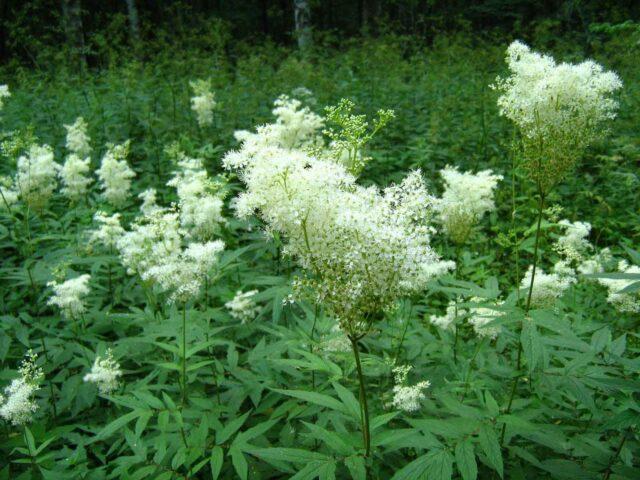
If you rub a leaf plate of meadowsweet with your fingers, it will begin to exude a sharp, but pleasant smell.
The root system is fibrous, creeping, without tuberous thickenings.
The flowers of meadowsweet are small, numerous, cream-colored, collected in panicles up to 20 cm in diameter. There are five petals in a calyx, rarely six can be formed. In the center are long yellow stamens. Flowering begins in June or July.
The meadowsweet fruit is formed in the form of a multileaf, which consists of 10-15 spirally twisted segments. As they mature, they harden. Fruiting begins in late July or August.

Up to half a thousand seeds can ripen on one meadowsweet plant, in the fall they will be spread by the wind or river waters
The plant can be found in damp meadows, on the edges of forests, or in swamps. A meadowsweet appears in damp glades, surrounded by dark thickets of bushes, on the banks of reservoirs.
The culture is widespread in Europe (Central part, Scandinavian countries, all the Atlantic coast). The meadowsweet is less common in the central regions of Ukraine, in the Northern Black Sea region, in the Carpathians. Meadowsweet is distributed throughout the territory of Central Asia, Mongolia. In Russia, the culture is mainly harvested in the European part, Ciscaucasia, Western and Eastern Siberia.
Chemical composition
Meadowsweet is rich in ascorbic acid, flavonoids (quercetin and kaempferol). The chemical composition contains traces of coumarins, phenolic compounds, tannins. The leaves and shoots of meadowsweet contain caffeic and ellagic acids, flowers - essential oil, camphor, aromatic compounds.
Types of meadowsweet
Currently, in addition to meadow species of meadow meadowsweet, ornamental plant species have been bred. They are cultivated in flower beds, in flower beds.
Variegated meadowsweet (variegated)
An unpretentious perennial that can winter without shelter in a frost of 40 ° C is a meadowsweet (the Latin name is filipendula ulmaria variegata). Throughout the summer, the culture retains its decorative qualities. Thanks to this, the plant has become popular with flower growers on many continents.
Variegata meadowsweet is a compact plant, the height of which does not exceed 0.9 m, the width of the bush is 60 cm. The leaves are large, pinnately dissected with a 5-lobed end lobe. The color is dark green, the entire surface is covered with bright yellow stripes.
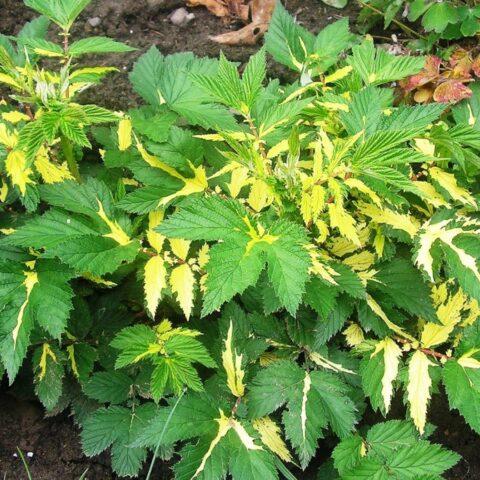
Variegated meadowsweet has an unusual color of leaves, retains a fresh decorative appearance for a long time
The buds are small, snow-white or creamy, with the most delicate vanilla-honey aroma. Flowering lasts from June to July, may be repeated in August. Sometimes peduncles are removed in order to preserve the beauty of openwork and variegated leaves for a longer time.
Variegated meadowsweet is suitable for mixed plantings. Looks good in green clusters near ponds, on a lawn, under a tree.
Elm-leaved meadowsweet Aurea
It is a perennial herb ideal for shady gardens. The culture is unpretentious, has good winter hardiness.
Aurea meadowsweet grows up to 90 cm. The bush is dense and wide. Branched shoots are covered with large, hairy, jagged leaves of a bright yellow hue. The inflorescence is large, rounded, and consists of many tiny cream-colored buds.

The bright yellow leaves of the meadowsweet Aurea look beautiful against the background of evergreens
Aurea meadowsweet grows well both in open areas and in the midst of plants, under the canopy of trees and bushes. The culture looks great in group plantings near ponds and on the lawn.
Meadowsweet Flore Pleno
This is a tall shrub, the length of shoots can reach 1.5 m. In width, the culture grows up to 1 m. Its stems are tall, straight, strong. The leaves are intermittent-pinnate, the upper 5-lobed lobe is large enough. The surface of the leaf plate is dark green, from below it is whitish.
Flowers of meadowsweet Flore Pleno are white or cream, double, small. They are collected in loose paniculate inflorescences at the ends of the shoots. The budding process begins in June.

Meadowsweet Flore Pleno differs from other representatives of the species by its lush, bright flowering
The culture feels equally well in the sun and in the shade. But he prefers loose, moist, fertile soils. Does not tolerate drying out of rhizomes.
The Flore Pleno meadowsweet is grown in various types of flower beds. The culture is suitable for single and group plantings near water bodies, on lawns.
Useful properties of meadowsweet
In ancient times, the culture was used as a salad plant, for the preparation of desserts and drinks, they scented linen, the air in the rooms.

Currently, meadowsweet is actively used in landscape design.
The medicinal properties and contraindications of the meadowsweet are well studied. Thanks to this, the plant is included in the official register of the Pharmacopoeia of Russia.
Medicinal properties of meadowsweet meadowsweet:
- enhances immunity;
- participates in the correct production of hormones;
- normalizes the functioning of the nervous system;
- reduces inflammation;
- reduces pain;
- thins the blood;
- fights inflammation;
- has an antiviral effect;
- good antiseptic.
Thanks to the tannins included in the composition, meadowsweet grass can have an astringent or irritating effect. It depends on how you cook it.
The influence of meadowsweet on human pressure
Meadowsweet contains a large amount of ascorbic acid. This substance is known to contribute to the proper functioning of the cardiovascular system.Due to the diuretic effect, a large amount of fluid is excreted from the body, the volume of circulating blood and the load on the heart are reduced. As a result, edema disappears, blood pressure decreases.
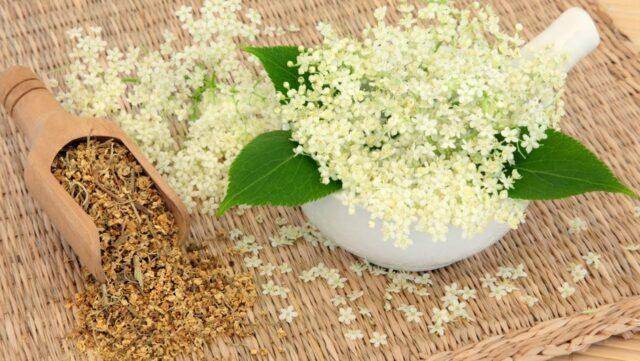
The meadowsweet herb is called "natural aspirin", it is taken when pharmaceutical tablets are contraindicated
Tincture of meadowsweet flowers thins blood well, lowers blood pressure, promotes resorption of blood clots in blood vessels, is effective in atherosclerosis, improves cerebral circulation.
Also, meadowsweet has a sedative effect. Herbal infusions are indicated for hypertensive patients suffering from nervousness. Herbal remedies with meadowsweet help strengthen the immune system, which improves overall well-being.
Application methods
Medicinal preparations are prepared from the flowers and roots of meadowsweet meadowsweet: teas, infusions, ointments. They are used to treat various diseases, as antiviral and immunostimulating agents.
Tincture
The tool is used during the recovery period after a stroke. 2 tsp pour half a glass of vodka with a strength of 40% of meadowsweet seeds, mix. Fill glass dishes with the composition, close tightly, leave for two weeks in a cool, dark place. The drug must be shaken daily.
After the specified time, the composition is filtered, poured into a clean container. Take 1 tsp. (can be dissolved in water) three times daily with meals. The course of treatment is three weeks. Then a break - seven days.
Infusion
Dry meadowsweet flowers (2 tsp) are poured with a glass of boiling water, kept for half an hour. The infusion is cooled, filtered. It should be taken six times a day for 2 tbsp. l.
The infusion is indicated for poisoning, including toxic ones, with snake bites. Outwardly, the agent is used as a lotion for psoriasis, acne, boils.
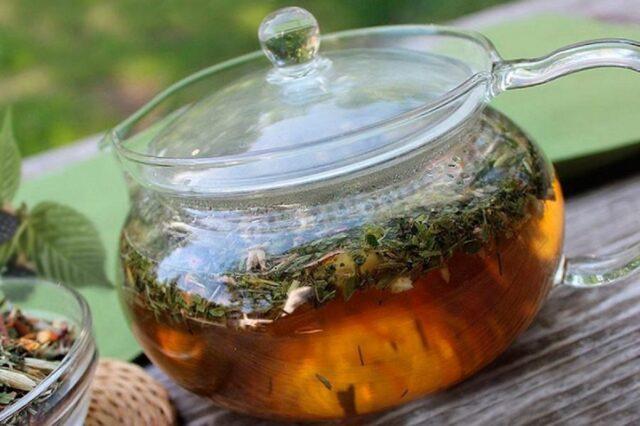
Infusions and decoctions based on meadowsweet are prepared in glass or enameled dishes, metal dishes are undesirable
Decoction
2 tsp chopped roots of meadowsweet are poured with a glass of boiling water, simmer for half an hour in a water bath. Then the solution is infused for an hour, filtered before use.
The tool is used half an hour before meals, 3 tbsp. l. three times a day. One course will be three weeks. The broth is effective for blood diseases.
Butter
50 g of chopped grass meadowsweet is poured with any vegetable oil. The liquid should completely cover the meadowsweet. The ingredients are mixed, the jar is wrapped, the healing oil is infused in a dark, cool place for two weeks.
The product is filtered, poured into a clean dish. Before use, the oil is heated in a water bath.
The drug is indicated for rheumatic, headache, muscle, joint pain, is suitable for the treatment of sciatica, colds, fever. The oil is rubbed into the sore spot twice a day or massage is done.
Ointment
To prepare the composition, take part of the dried flowers of meadowsweet and five parts of any fat. The base is preliminarily liquefied in a water bath, mixed with raw materials.
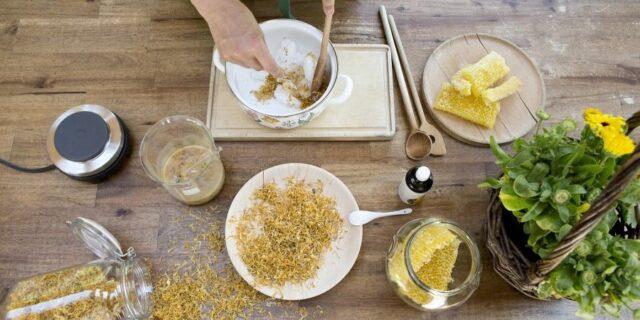
To prepare the ointment, you can use badger fat or petroleum jelly.
The remedy is used for joint pain, rheumatism, osteochondrosis, as an anti-inflammatory and warming agent.
Tea
1 tbsp. l. dry meadowsweet flowers are poured into 0.5 liters of boiling water, insisted for 15-20 minutes. The ready-made infusion is drunk like tea. Consume no more than 3 g of crushed grass or flowers per day.
Tea from meadowsweet is used for migraines, heart disease, and suffocation.
The use of meadowsweet in medicine
Meadowsweet has an antiseptic and anti-inflammatory effect. Outwardly, in the composition of liquids, it is applied for boils, ulcers, skin diseases.
The use of meadowsweet for washing wounds
Fresh broth of meadowsweet is used for washing purulent wounds.Tannins have a bactericidal effect. Lotions are indicated for the treatment of ulcers and boils. In this case, it is recommended to mix the meadowsweet with the coil equally.

Meadowsweet tincture is effective in the treatment of trophic ulcers
Blood thinning with meadowsweet
Meadowsweet has the ability to thin the blood, reduce its viscosity. Infusions of herbs and flowers are effective for increased coagulability, a tendency to thrombosis, thrombophlebitis. Herbal remedies will help improve the condition after ischemic stroke and heart attack. Broths are prescribed in cases where pharmacy aspirin is contraindicated due to stomach diseases. Decoctions from meadowsweet root are also effective. These drugs contain coumarins, which reduce the viscosity of the blood.
Vase-leaved meadowsweet with hyperthyroidism
The main treatment for this disease is thyroid hormone replacement therapy. Herbal medicine based on meadowsweet is an additional means of correcting hypothyroidism.
Vitamin C, contained in the terrestrial part of the plant, is involved in the correct production of hormones, which is important in hyperthyroidism. Decoctions and infusions of meadowsweet are shown as additional means in the treatment of this disease.
Treatment of gynecological diseases with meadowsweet
For douching with leucorrhoea and infertility, a special decoction is made from meadowsweet grass. For this, 2 tbsp. l. dry flowers and herbs are boiled in 1 liter of water for half an hour. Then the solution should be filtered, bring its volume to 1 liter with boiled water. For treatment, douche twice a day. The course of therapy is 10-12 days. Be sure to take breaks during menstruation.
Meadowsweet for skin diseases
A medicinal powder is preliminarily prepared: dry meadowsweet flowers are ground in a mortar. The remedy will help with sweating of the feet, bedsores and diaper rash. If you mix flower powder with fish oil, the resulting ointment is used for burns, for psoriasis.
The ash from the burnt buds of meadowsweet stops the blood. If you mix it with mineral water and a drop of lemon juice, it turns into an ointment for inflammation on the skin. Meadowsweet tea heals wounds and ulcers.
Application in cosmetology
The meadowsweet is rich in flavonoids, phenolic compounds with powerful antioxidant activity. Meadowsweet extract is used as a decongestant and fat burning agent in weight loss products.

Meadowsweet, brewed like tea, will improve the condition of the skin if you wash your face with liquid in the morning.
Meadowsweet is effective in the care of oily skin. Also suitable for mixed type if indicated.
What cosmetic defects can be eliminated with the help of meadowsweet meadowsweet:
- decreased skin tone;
- inflammation, irritation on the skin;
- swelling;
- bags under the eyes;
- oily scalp.
Broths with meadowsweet are widely used in home cosmetology. On their basis, ice, cleansers, compresses are prepared.
Contraindications to the use of meadowsweet
Preparations based on meadowsweet have many medicinal properties. Not everyone can use them. Before starting therapy, it is necessary to familiarize yourself with the contraindications.
Who can not be treated by a meadowsweet:
- children under 14 years old;
- pregnant women;
- patients with epilepsy;
- people suffering from intestinal atony;
- patients with hemophilia;
- allergy sufferers.
With hypotension, a lowered platelet level, a tendency to constipation, meadowsweet can not be categorically used. Cases of individual intolerance to the herbal remedy are also possible.
Planting and caring for variegated meadowsweet
The culture prefers open sunny areas, but it also actively grows in partial shade. In closed glades, decorativeness decreases: budding is not so lush and bright, soon the bush may stop flowering altogether.
For the cultivation of variegated meadowsweet, as well as elm-leaved, fertile, loose soil with good drainage is chosen. The acidity of the soil should be weak or neutral.You can propagate meadowsweet by seeds or by dividing the bush. The first method is suitable for all types of meadowsweet.
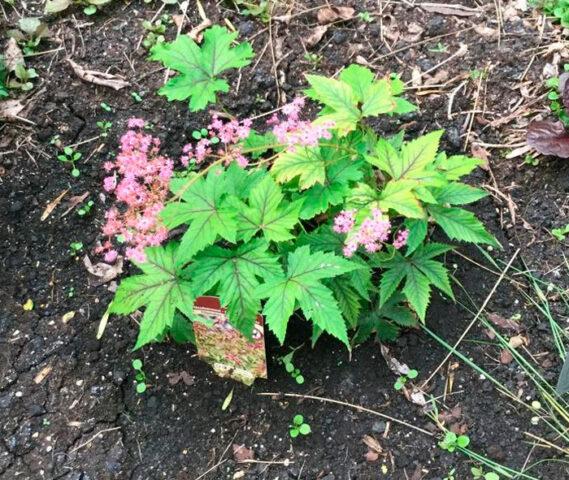
Meadowsweet seedlings are planted in the fall, in September before the onset of cold weather
If there is a large healthy bush on the site, it is dug up, and the rhizome is divided into 3-5 parts to obtain young plants.
Meadowsweet seedlings quickly take root, manage to take root before the onset of the first frost.
In September, small holes up to 15 cm deep are dug, a seedling is placed there, the rhizome is covered with loose soil, and the plant is watered.
The first week, young bushes are watered daily. After the soil is moistened as it dries. The soil is loosened in a timely manner, weeds are uprooted. In June and July, variegated meadowsweet is fed with complex mineral fertilizers.
Flowering occurs one year after planting. Young plants in the first winter need shelter, after which they endure frosts without problems.
Collection and preparation of meadowsweet grass
The leaves and inflorescences of meadowsweet are harvested in the summer during the budding period. They are laid out in one layer in the shade under a canopy. You can use special dryers, setting the temperature to no higher than + 40 ° C. The shelf life of finished raw materials is no more than a year.
The roots are harvested in autumn or early spring before flowering. They are dug up, washed, cut into pieces. The workpieces are dried under a canopy or in a well-ventilated area. The shelf life of finished raw materials is three years.
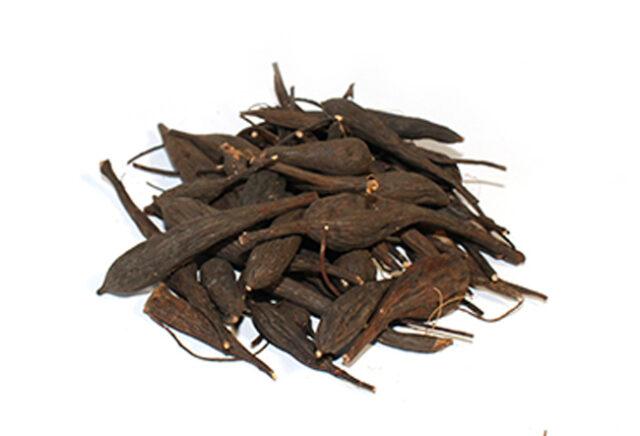
For the preparation of medicines, they take well-dried meadowsweet roots without rot and mold
Conclusion
The meadowsweet is included in the official pharmacopoeia of many countries. The medicinal plant is especially widely used in folk medicine. It is a source of substances with high biological activity. Due to its unique composition, the meadowsweet occupies one of the first places among medicinal plants.








